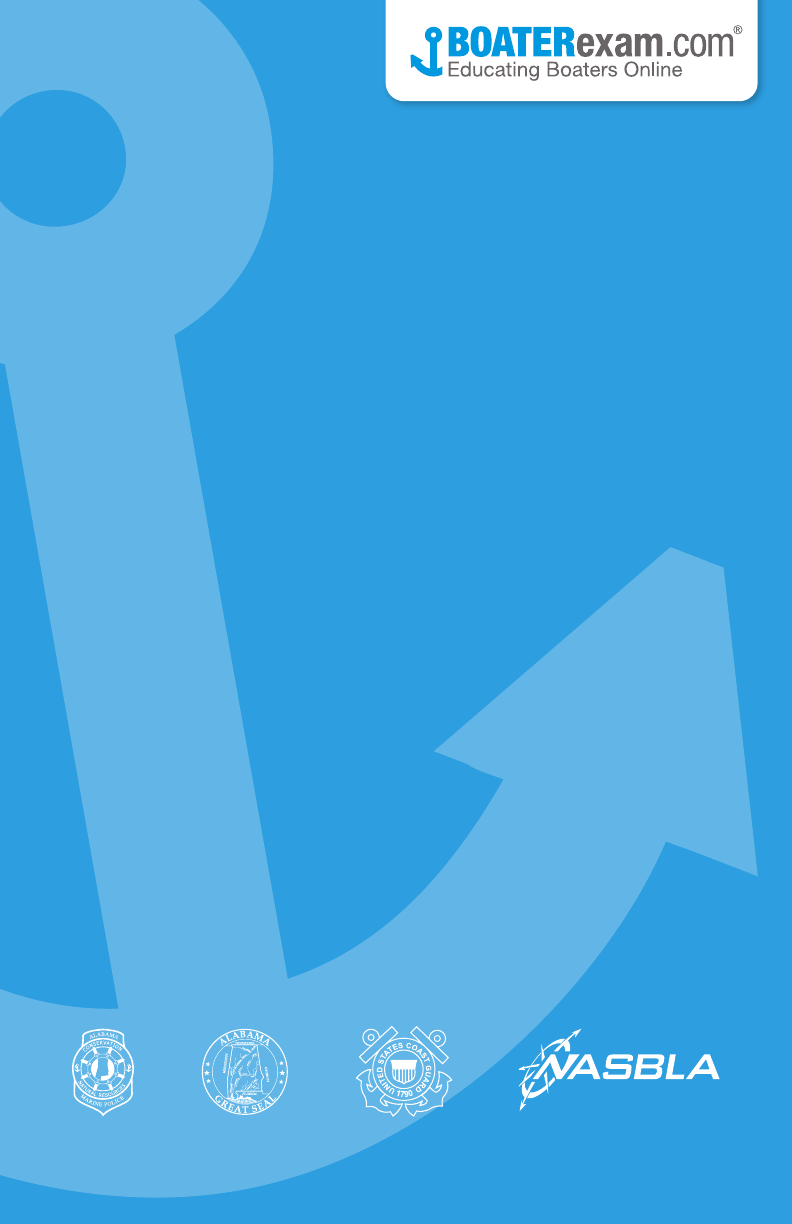
State of Alabama
BOATING RULES & REGULATIONS
2
TABLE OF CONTENTS
Alabama Registation Requirement ................................................................................... 3-4
Certicate of Number .......................................................................................................... 4
Registration Number and Decal ........................................................................................ 5-6
Alabama PFG Requirements ............................................................................................ 7-8
Accident Reporting in Alabama ............................................................................................ 9
Personal Watercraft laws and Regulations ........................................................................ 10
Additional PWC Requirements ........................................................................................... 11
Towed Water Sports in Alabama ........................................................................................ 12
Dividing and Snorkeling in Alabama ................................................................................... 13
Aquatic Nuisance Species .................................................................................................. 14
Marine Sanitation Device Regulations .......................................................................... 15-16
No Discharge Zones in Alabama ........................................................................................ 17
Litter Laws in Alabama ....................................................................................................... 17
Operator Age Restrictions in Alabama .......................................................................... 18-19
No Wake Speed ................................................................................................................. 19
Slacken Speed ................................................................................................................... 20
Mufers and Noise Levels .................................................................................................. 21
Unsafe Practices ........................................................................................................... 22-24
Boating Under the Inuence .............................................................................................. 25
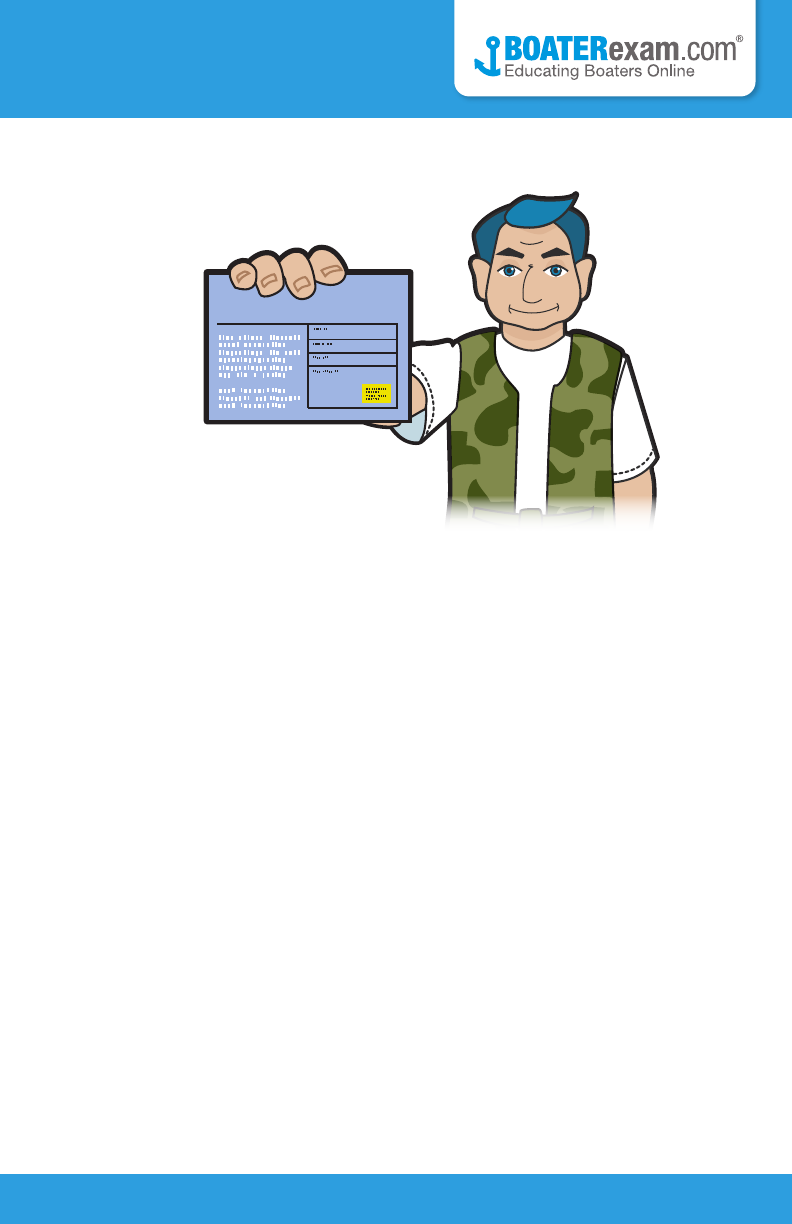
State of Alabama
BOATING RULES & REGULATIONS
3
ALABAMA REGISTRATION REQUIREMENTS
Registration
The Marine Police Division of the Department of Natural Resources
regulates the boating laws in Alabama.
All powered watercraft (including gasoline, diesel and electric motors)
that are operated mainly on Alabama waters must be registered. Some
vessels are exempt from the boat registration requirements, including
those that are:
• Non-motorized, not including sailboats and vessels for rental.
• Currently registered and kept in another state;
• Holding a valid temporary Certicate of Number;
• Registered in a country other than the U.S. and using Alabama
waters only on a temporary basis;
• A ship’s lifeboat; or
• Owned by either federal, state, county or municipal governments
within the U.S.
REGISTRATION

State of Alabama
BOATING RULES & REGULATIONS
4
To register, renew or transfer ownership, you can visit your local county
Judge of Probate or License Commissioner. You can also register or
renew your vessel registration, only with proof of payment of sales and
use tax, at the Marine Police Division ofce in Montgomery.
An application can be downloaded and lled out prior to registering at
the Probate, License Commissioner’s or Marine Police Ofce. Be sure
to bring all documentation such as previous registration, bill of sale,
and proof of payment of sales tax with the application.
Download a New Registration, Transfer, & Replacement Application.
OWNERSHIP
As a boat owner in Alabama, you must have at least a valid temporary
certicate of number before you can legally operate on state waters.
Once the registration has been issued, you are required to:
• Sign the certicate and carry it on board when operating; and
• Notify the Alabama Marine Police Division within 15 days if you
change residences, or if the vessel has been lost, stolen, destroyed,
or abandoned.
Your registration is valid for one year from the date of issue. The date
of required renewal depends on the rst letter of the vessel owner’s last
name. For more information, visit the Outdoor Alabama website.
CERTIFICATE OF NUMBER

State of Alabama
BOATING RULES & REGULATIONS
5
AB 1234 BXAB 1234 BX
SPACES OR
HYPHENS
SPACES OR
HYPHENS
STARBOARD PORT
When you successfully register your vessel, you’ll receive a certicate
and a decal.
Your permanent registration number appears on the right-hand side of
the certicate preceded by the letters AL. This number must be placed
on each side of the bow of the registered vessel in a position that is
clearly visible at all times. The number must also be:
• BLOCK characters, no less than three inches high and contrasting
with the background color of your boat;
• Separated by letters with a space or a hyphen; and
• Read from left to right; For example: AL 1234 BX or AL-1234-BX.
The validation decal must be displayed within 6 inches before or after
and in line with the registration numbers on both sides of the boat’s bow.
It’s your responsibility to make sure your boat is properly marked and
documented. It’s also a good idea to always keep your papers with
the boat, in a waterproof case for safe keeping.
REGISTRATION NUMBER AND DECALS

State of Alabama
BOATING RULES & REGULATIONS
6
Refer to the chart below for a list of registration fees.
Registration Item Fee
Class I Registration
Class II Registration
Class III Registration
Class IV Registration
Class V (Dealer) Registration
Transfer of a Vessel’s
Ownership
$11.00 plus $1.00 issuance fee
$15.00 plus $1.00 issuance fee
$30.00 plus $1.00 issuance fee
$50.00 plus $1.00 issuance fee
$26.00 for initial, $4.00 for each
additional dealer tag
(Applies to vessels with a current year registration but needing to be
transferred into the new owner’s name)
Transfer/Renewal $1.00 plus .25 issuance fee
(If the vessel has no current registration, the class fee will also apply
to transfer the vessel into the new owner’s name)

State of Alabama
BOATING RULES & REGULATIONS
7
Personal Flotation Devices (PFDs)
When boating in Alabama, you are required to have a wearable PFD
available for each person on board your boat. In addition, if your vessel
is longer than 16 feet, you must also have at least one U.S. Coast Guard
approved Type IV PFD, either a ring buoy or seat cushion. There are
some exceptions to this requirement, including:
• Personal Watercraft;
• Canoes, kayaks; and
• Inatable rafts
Passengers being towed behind a vessel must wear a U.S.
Coast Guard Approved PFD at all times that is designed for the activity.
All persons on a personal watercraft must wear a PFD while underway.
Inatable PFDs are not approved for children and should not be used
for high impact sports such as water skiing or operating a personal
watercraft.
If you are operating a vessel within 800 feet of any hydro-electric dam or
navigational lock or dam, all persons on board must be wearing a U.S.
Coast Guard approved PFD (either type I, II, III or IV) in accordance with
the manufacturer’s instructions.
ALABAMA PFD REQUIREMENTS
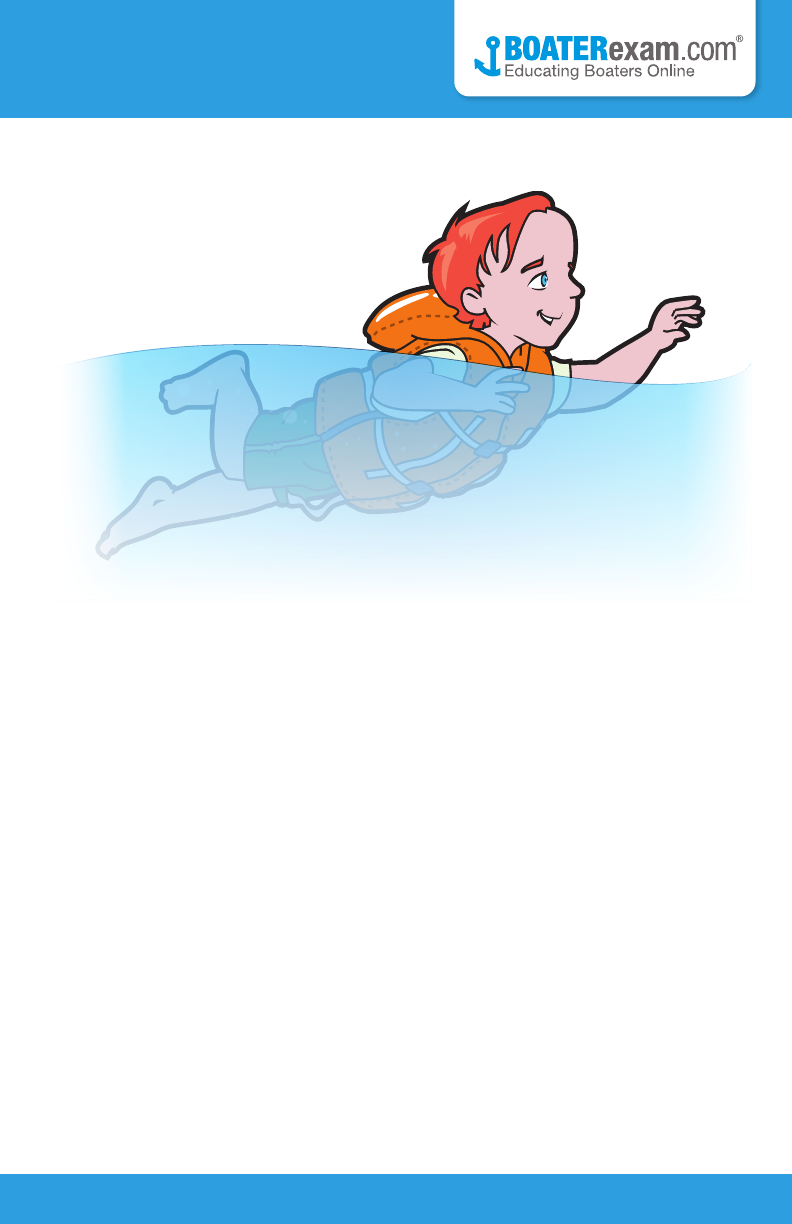
State of Alabama
BOATING RULES & REGULATIONS
8
Child PFD Requirements
All boaters or passengers under 8 years of age are required to wear a
PFD while on board, unless they are below deck or in an enclosed cabin.
ALABAMA PFD REQUIREMENTS
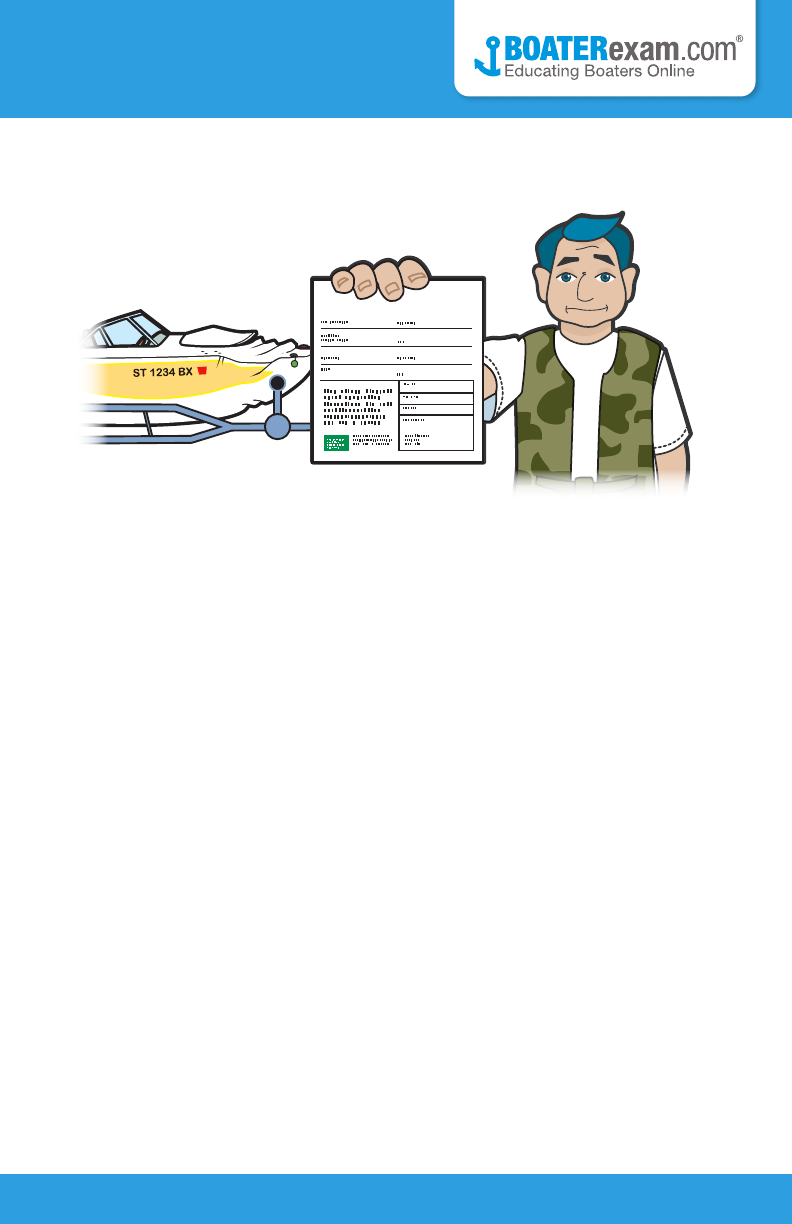
State of Alabama
BOATING RULES & REGULATIONS
9
ACCIDENT REPORT
If you are operating a boat that is involved in a collision on the water,
a report must be led for any accident involving:
• $50 or more in damages;
• Complete loss of a vessel;
• Injuries causing disability for more than 72 hours; or
• The death or disappearance of any person.
In these situations when a written report is required, it’s your
responsibility as the boat operator to submit a completed accident
report form, as quickly as possible, to the Alabama Marine Police
Division (AMPD). The report must be submitted within 10 days of
the accident.
If the operator of the vessel involved is not able to give the required
notice, it becomes the responsibility of each person on board to notify
the AMPD or a member of its law enforcement team, or determine that
the notice has been given.
ACCIDENT REPORTING IN ALABAMA
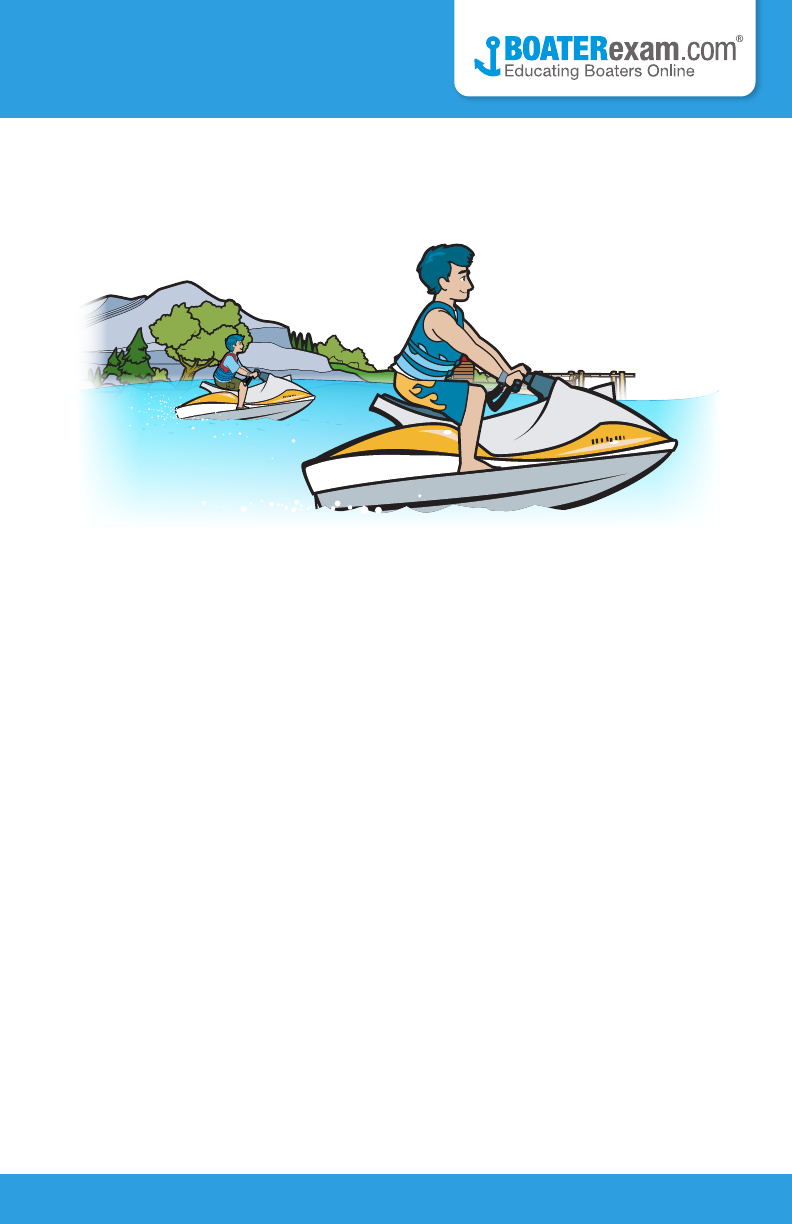
State of Alabama
BOATING RULES & REGULATIONS
10
As you learned in Chapter 7, personal watercraft are very powerful
for their size and demand the same respect as any boat. Likewise,
PWC operators are required to follow the same rules and regulations
as any powerboat operator, including registering with the state and
carrying a B-1 re extinguisher on board. In addition, there are specic
requirements for PWC operated in Alabama.
• The operator and all passengers of a PWC must wear a U.S.
Coast Guard approved PFD at all times.
• Persons can only be towed behind a PWC if the watercraft is
equipped with rearview mirrors on both the left and right sides.
Each mirror must have a viewing area of 2.5 inches in height by 4
inches in width for a total minimum viewing area of 20 square inches.
The mirrors must not be attached to the steering portion of the PWC.
PERSONAL WATERCRAFT LAWS
AND REGULATIONS
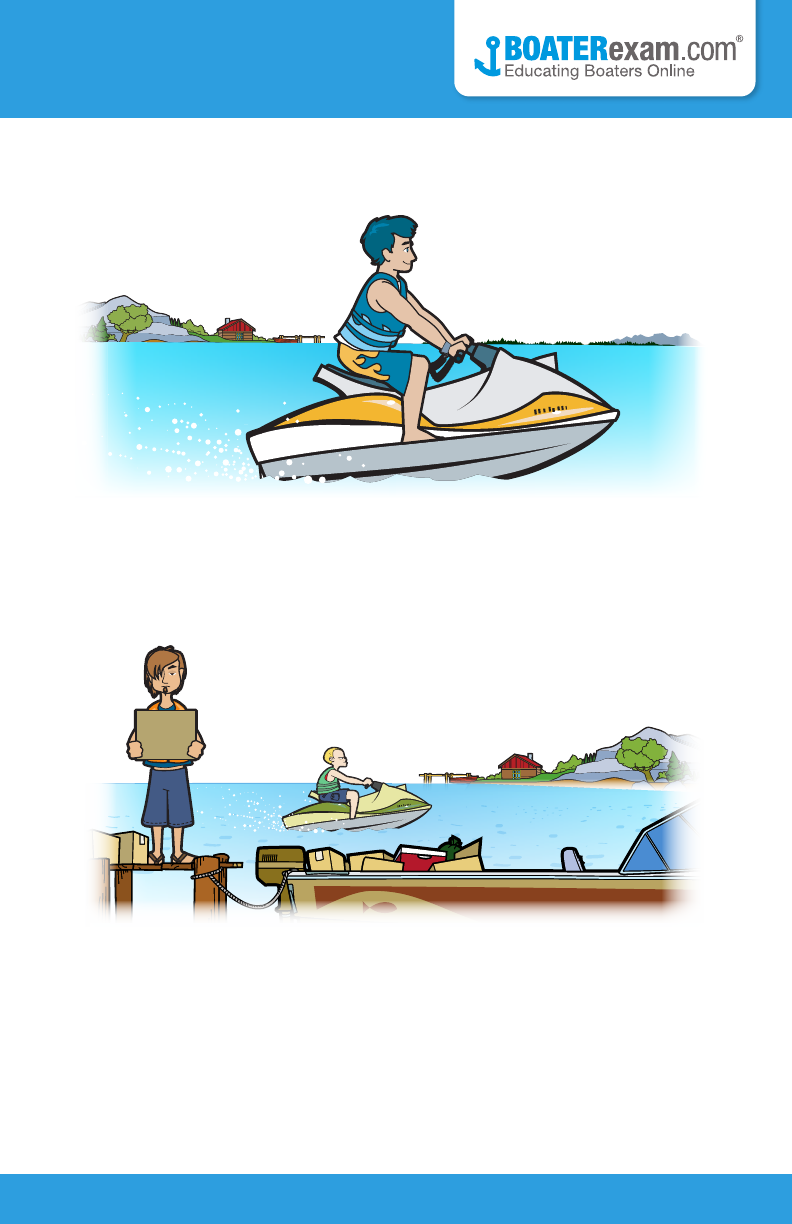
State of Alabama
BOATING RULES & REGULATIONS
11
ADDITIONAL PWC REQUIREMENTS
Hours of Operation
PWCs may be operated at all hours of the day, but must be tted with
the required lights in order to operate between sunset and sunrise.
Operator Age Restrictions
PWC operators in Alabama must be at least twelve (12) years old, but
cannot operate without adult supervision until at least fourteen (14) years
of age. Operators must have an Alabama Boat Operators Certicate.

State of Alabama
BOATING RULES & REGULATIONS
12
TOWED WATER SPORTS IN ALABAMA
• When participating in towed water sports in Alabama,
there are several rules and regulations you must follow.
• All persons, regardless of age, must wear a Type I, II, III or V U.S.
Coast Guard approved PFD while water skiing, riding a tube or
being towed behind a vessel in any manner.
• Skiing while under the inuence of alcohol or drugs, including
prescription narcotics and illegal drugs is forbidden.
• When towing an individual behind a vessel, except personal
watercraft, in addition to the operator, there must also be an
observer that is 12 years of age or older,
• OR, the boat must be equipped with a wide angle mirror that has a minimum
viewing surface of 78 square inches and a minimum eld of vision of 170 degrees.
• Water skiing or towing people on other devices is only allowed
1 hour before sunrise until 1 hour after sunset.
• The operator of the boat may not manipulate or control the boat
so as to cause the person being towed to collide with any object or
person, with the exception of persons engaged in competitive or
recreational skiing with regards to jump buoys and similar devices.

State of Alabama
BOATING RULES & REGULATIONS
13
DIVING AND SNORKELING IN ALABAMA
Diving and swimming are popular activities to participate in while
on the water. Whether you are operating a boat or diving from a boat,
it’s important to take the following safety precautions.
The operator of a vessel engaged in diving must display a blue and white
ag on the vessel. A red “diver-down” ag with a white diagonal stripe
carried on a buoy is used to mark areas where there is diving activity.
Operator Responsibilities
As a boat operator, be sure you know what the diver down ag looks like.
If you see this ag, keep a safe distance from the vessel displaying the
ag and the diving site, and proceed at a slow speed, keeping a close
lookout for divers in close proximity to your watercraft.
In Alabama, you are required to keep a distance of at least 100 feet from
the vessel engaged in diving and the diving site.
Remember, divers can be on any body of water, so it’s important to keep
a close watch when you see a diver down ag.
Diver Responsibilities
If you are snorkeling or diving, you must display the diver down ag.
You should not dive in busy areas where there are numerous boats
occupying the space, and should also refrain from diving in narrow
channels or water ways that would restrict vessels from passing.

State of Alabama
BOATING RULES & REGULATIONS
14
AQUATIC NUISANCE SPECIES
Non-native aquatic species, plants, sh and animals are invading
Alabama’s waters. Hydrilla, Egeria Densa, water hyacinth and zebra
mussels are nuisance species that can be accidentally transported by
recreational boaters when caught in propellers, intakes or attached to
hulls. These pests can multiply dramatically under the right conditions,
displacing native species, clogging waterways, and impacting navigation
and recreation. Once introduced, they are nearly impossible to eliminate.
To help prevent the introduction and spread of non-native species from
one body of water to another, you should take the following actions.
• Before leaving a body of water, inspect your boat and dispose of any
animals or aquatic plants.
• Flush raw-water cooling systems and clean sea strainers before
moving your boat from one body of water to another.
• Empty bait buckets and remove any plant fragments from bait wells,
shing gear, trailers, dive gear or props.
• Dispose on land into a garbage receptacle.
• Drain all water from your bilge, motor and live wells.
• Wash your boat before putting it into a new body of water; and
• Report new infestation of non-native aquatic species to the U.S. Fish
and Wildlife Service.
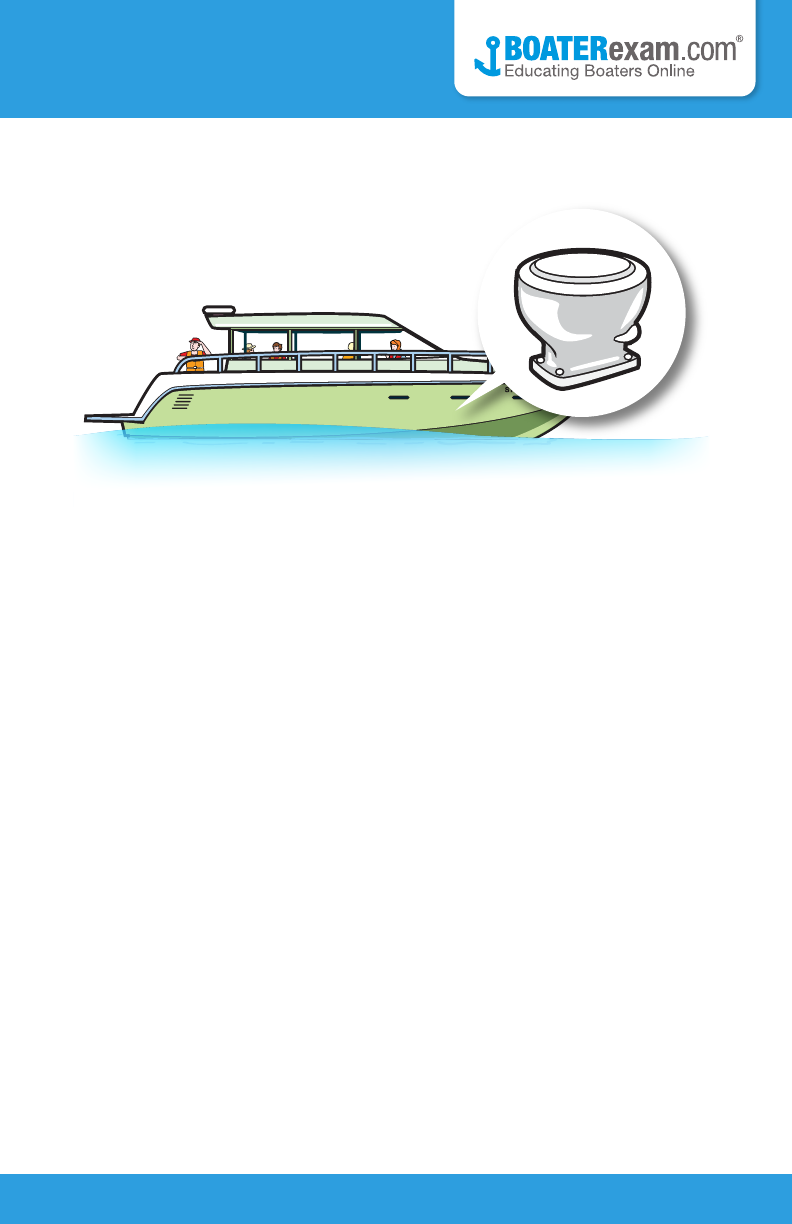
State of Alabama
BOATING RULES & REGULATIONS
15
MARINE SANITATION DEVICE REGULATIONS
Boats operating on state waters with an installed toilet must also have a
sanitation system to prevent pollution and discharge of raw sewage. A
typical sanitation system consists of: an installed toilet, a waste treatment
system, or MSD, and/or a holding tank.
All vessels with MSDs installed require annual inspection by Marine
Police Ofcers. Upon successful completion of the inspection, the vessel
owner will be issued a Compliance Decal which will be valid for one year.
With over one million boaters enjoying Alabama’s 1 million acres of
lakes, 1,600 miles of rivers and 53 miles of coastline each year, comes
a growing concern for clean water and other environmental issues,
such as marine sewage and litter disposal. To combat these health
and environmental problems, the State Legislature passed the Marine
Sanitation Act, (2002-59), which became effective in 2003. This Act
regulates sewage discharge from recreational vessels and
residence boats.

State of Alabama
BOATING RULES & REGULATIONS
16
MARINE SANITATION DEVICE REGULATIONS
The following is a synopsis of the Act:
• Portable toilets are prohibited from dumping raw sewage into
any state waters.
• Discharge of untreated sewage is prohibited on all state waters.
Gray water, including galley water, bath and shower water, and bilge
water, is exempt.
• All recreational vessels and residence boats with marine sanitation
devices must be inspected annually by a Marine Police ofcer or
other Department of Conservation employee. A compliance decal is
issued if vessel meets the requirements of the Act and Department.
• All marine sanitation devices must meet the U.S. Coast Guard and
EPA standards.
• Marine Police ofcers or any duly sworn peace ofcer may board
and inspect for compliance if there is probable cause to believe that
a violation of this act or departmental rules has occurred. First time
offenders will receive a warning and will have 90 days to come into
compliance. Conviction of this Act will result in a minimum ne of
$100 up to a maximum ne of $1000.

State of Alabama
BOATING RULES & REGULATIONS
17
NO DISCHARGE ZONES IN ALABAMA
LITTER LAWS IN ALABAMA
Alabama’s no discharge zones include the following bodies of water
and any others that meet the federal guidelines:
• Smith Lake,
• All lakes on the Tallapoosa River system
• All lakes on the Coosa River system with the exception
of Weiss Lake.
Disposal of Trash, Garbage or Plastics from a Vessel
In Alabama, it is unlawful for any person to discharge overboard, or place
in or upon the waters of the state, any trash, garbage or plastics. Such
items must be taken to shore and legally disposed of on land.
All vessels must have on board a container or storage compartment
for the proper disposal of trash, garbage, or plastics. Such container or
storage compartment must assure that all waste, trash or plastics cannot
be inadvertently blown overboard.
All vessels must also have a container or bag that is appropriate for
moving trash, garbage or plastics to shore for legal disposal.

State of Alabama
BOATING RULES & REGULATIONS
18
OPERATOR AGE RESTRICTIONS IN ALABAMA
Persons who are under the age of 12 may not, in any instance, operate
a motorized vessel including personal watercraft.
In accordance with the Roberson/Archer Act of 1994, all persons who
operate a motorized vessel, including personal watercraft, on Alabama’s
waters are required to obtain an Alabama Boat Operators Certicate.
Boat operators must be at least 12 years of age to receive their Alabama
Boat Operators Certicate.
The Boating Safety Enhancement Act which came into effect on January
1, 2002 set the minimum age for operating a motorized vessel without
direct adult supervision at 14 years of age. However, there are certain
exceptions to this rule; the following may operate a vessel without adult
supervision:
• Residents of the state of Alabama who were 12 years of age or
older on January 1, 2002 that have obtained their Boat Operators
Certicate.
• Residents of the state of Alabama who had obtained a Boat
Operators Certicate prior to January 1, 2002.
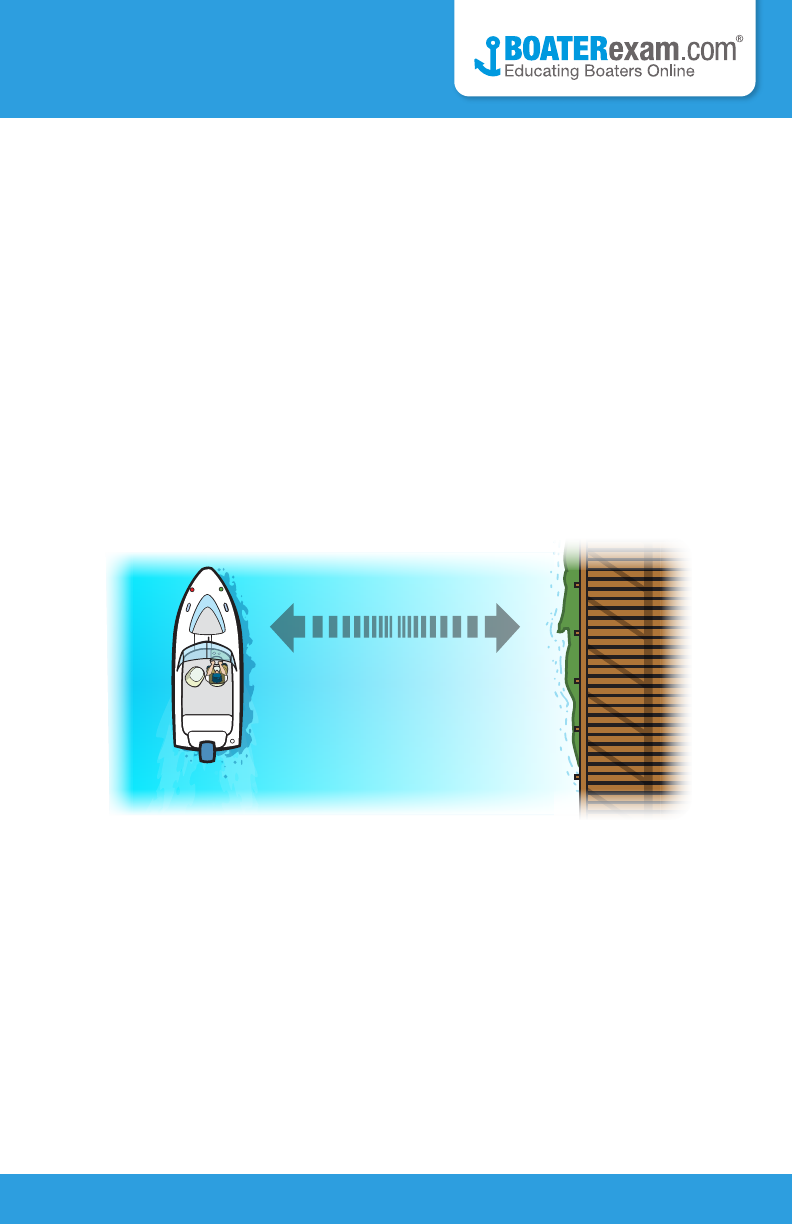
State of Alabama
BOATING RULES & REGULATIONS
19
• Non-Residents aged between 12 and 14 years, who had obtained
a Boat Operators Certicate in their home state prior to January 1,
2002.
• A non-resident 12 years old but less than 14 years old who has not
obtained an operator’s license, or who has an operator license from
his or her home state may not operate a vessel unless there is a
person 21 years old or older with a valid operator’s license (unless a
non-resident) on board and in a position to take immediate physical
control of the vessel if necessary. Non-residents 14 years old or older
may operate alone in Alabama under the 45 day grace period.
NO WAKE ZONE
“No wake” speed refers to the slowest possible speed required in order
to maintain steerage and headway.
In Alabama, it is unlawful to operate at greater than ‘no wake’ speed
when around gas docks, marinas, boat ramps, and people in the water
even if not marked by a regulatory marker.
You may be held responsible for damage caused by your vessel’s wake
or wash resulting from negligent or careless operation.
NO WAKE
ZONE
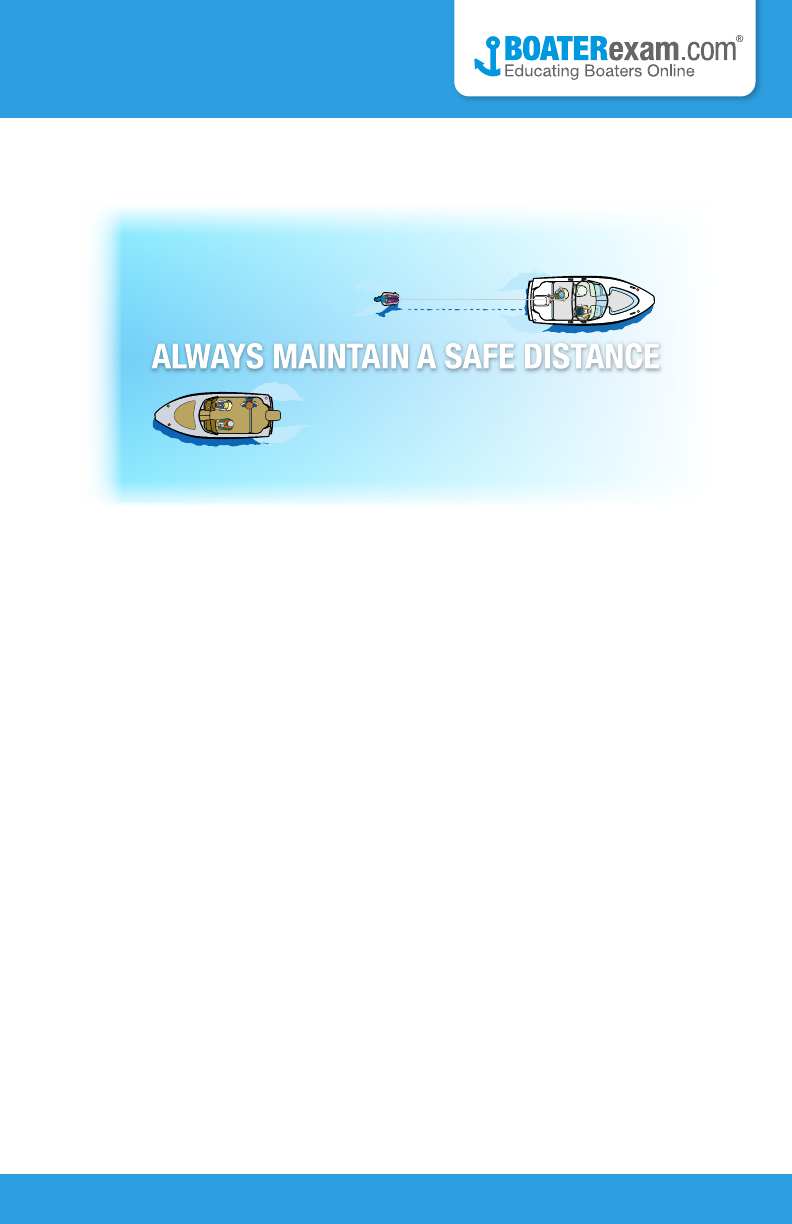
State of Alabama
BOATING RULES & REGULATIONS
20
SLACKEN SPEED
As an operator in Alabama, you must reduce your vessel’s speed to
avoid endangering persons or property from the effect of your vessel’s
wake. You must reduce speed when approaching or passing the
following:
• Vessels underway, lying to, at anchor, or made fast to the shore;
• Piers, Docks or Boathouses;
• Persons in the water;
• Persons involved in towed water sports; and
• Persons on a surfboard
Certain bodies of water in Alabama may have local restrictions as to
type and size of vessel or motor horsepower, restricted use areas, boat
speed, and times for use. Check with the local authorities for these
additional restrictions.

State of Alabama
BOATING RULES & REGULATIONS
21
MUFFLERS AND NOISE LEVELS
In Alabama, all vessels propelled by an internal combustion engine are
required to have a mechanical means of reducing (mufing) the engine
exhaust sound level.
No one may operate, or give permission to operate, a motorboat whose
exhaust sound exceeds 86 dBA when measured from a minimum
distance of 50 feet.
The use of cut-outs is prohibited, except for vessels competing in a
regatta or ofcial boat race, and for such vessels while on trial runs.
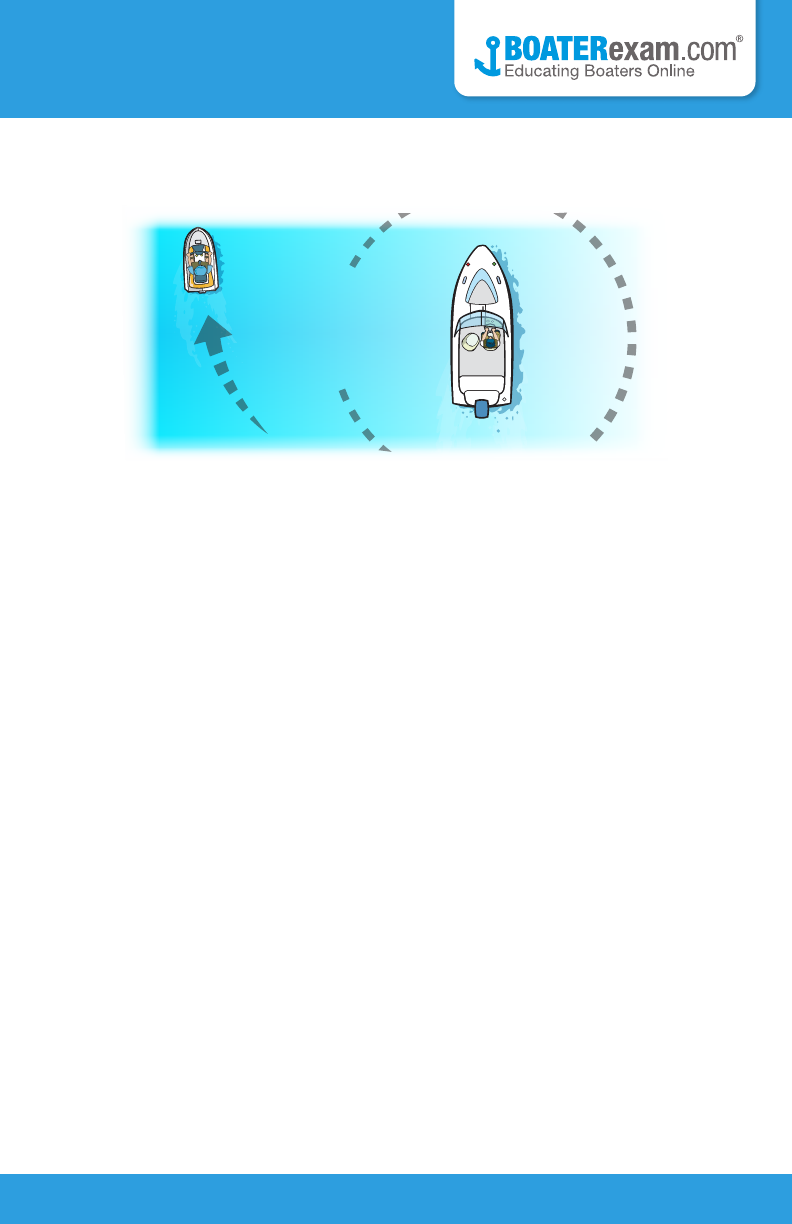
State of Alabama
BOATING RULES & REGULATIONS
22
UNSAFE PRACTICES
The following acts and maneuvers are considered dangerous & illegal
while boating in Alabama:
Reckless Operation
It is illegal to operate a vessel in a manner that endangers the ability to
conserve the safety, rights or property of others. The following are a few
examples:
• Endangering others or their property, by allowing the wake of your
vessel to potentially harm another or their property.
• Operating a vessel at such speed or maneuvers a vessel in such a
manner as to endanger the life, limb or property of another person.
You are responsible for your vessels wake. Wake jumping in close
proximity to another vessel.
• Failing to conform to boating signage such as posted speeds,
indicated restricted entry zones, diver down ags, etc. No person
shall operate a boat at a speed in excess of a Slow - No - Wake in
a posted no wake zone. No person may operate a vessel at speeds
greater than are reasonable or prudent given the existing weather
conditions, watercraft trafc or persons in the water.
SAFE
DISTANCE

State of Alabama
BOATING RULES & REGULATIONS
23
Operating at an unsafe speed
Boaters must always operate their vessel at a safe speed as well as
adhere to any indicated speed limitations.
Failure to maintain adequate distance
Boaters must maintain the designated ‘slow-no- wake’ speed in the
circumstances discussed above as well as keep their distance from
water skiers or vessels towing someone on another device.
Exceeding maximum capacity
The recommended capacity indicated on the boats’ capacity plate should
not be exceeded. Operation of a vessel loaded or powered in excess of
the maximum capacity affects the stability of the vessel and makes the
chance of a capsizing or fall overboard more likely.
Not maintaining a proper lookout
All operators are required to keep a constant lookout for other vessels,
hazards and/or people in the water.
Dangerous operation
Boaters must make sure that the vessel is being operated in such a
manner that its occupants or others sharing the water are not in any
danger. In Alabama, if any ofcer empowered to enforce the laws
observes a vessel being used without sufcient lifesaving or re-ghting
devices or in an overloaded or otherwise unsafe condition and in his
judgment such use creates an especially hazardous condition, he may
direct the operator to take whatever immediate and reasonable steps that
would be necessary for the safety of those aboard the vessel, including
termination of activity until the situation creating the hazard is corrected
or ended.
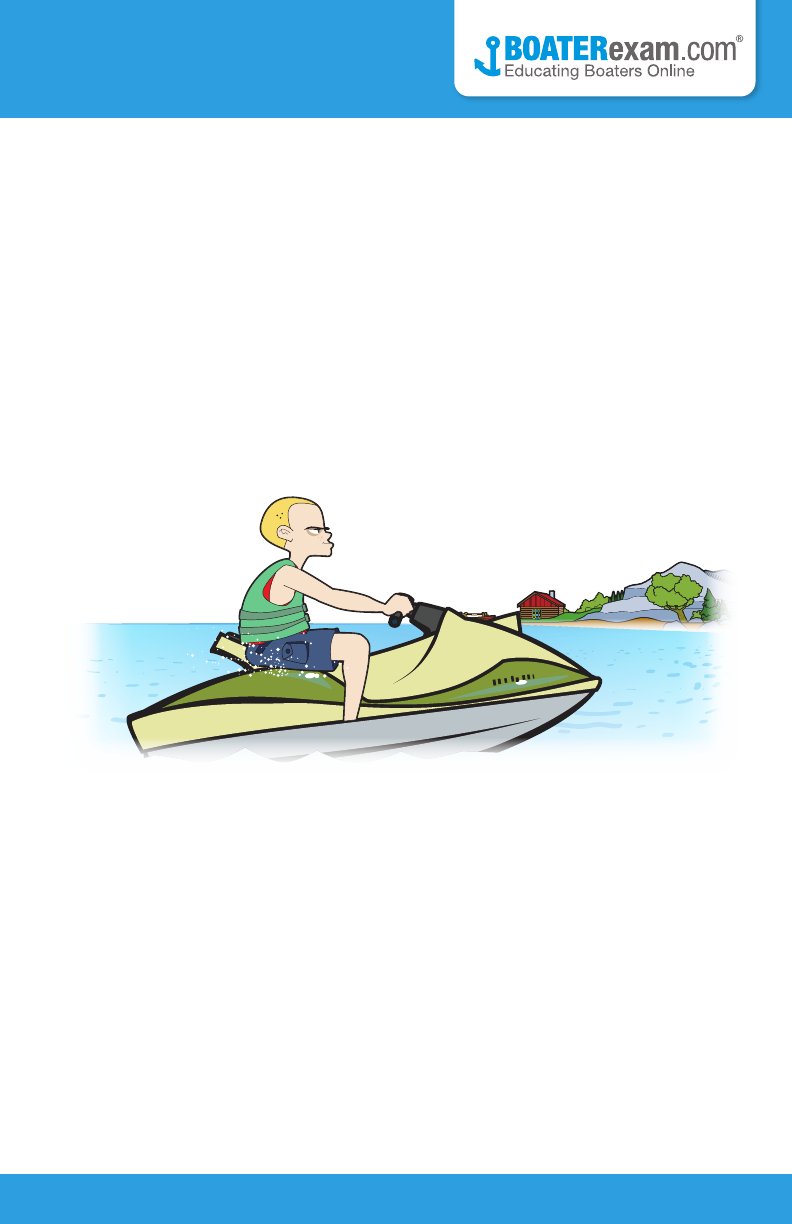
State of Alabama
BOATING RULES & REGULATIONS
24
Not maintaining proper seating aboard your vessel
In Alabama, it is unlawful to allow any person to ride or sit on the bow,
gunwales, transom, or on the decking over the bow of the vessel while
underway unless such a vessel is provided with adequate guards or
railing to prevent passengers from falling overboard. Passengers or other
persons aboard a vessel may occupy these areas of the vessel to moor
or anchor the vessel, to cast off, or for any other necessary purpose.
For safety reasons it is recommended that boaters do not stop or anchor
beneath bridges, in a channel or at a launch ramp.
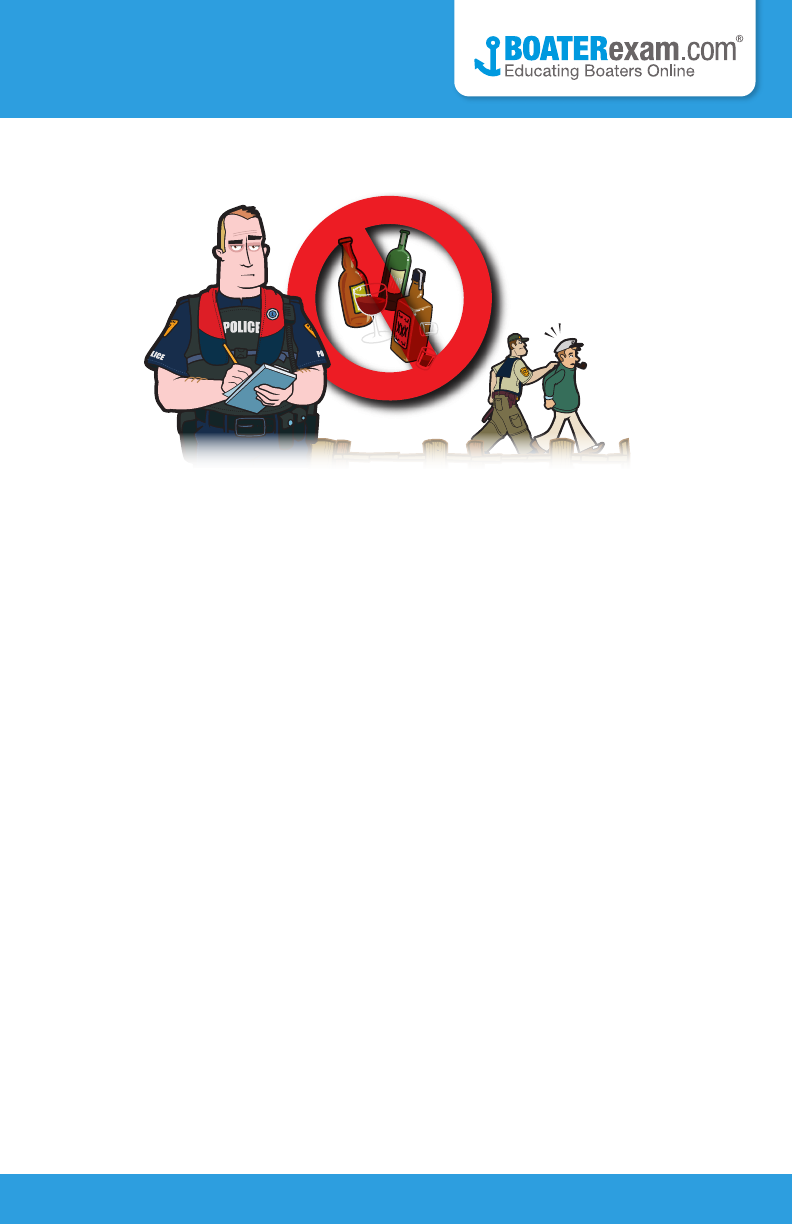
State of Alabama
BOATING RULES & REGULATIONS
25
UNSAFE PRACTICES
A boater with a blood alcohol content of .08% or more is presumed to be
under the inuence of alcohol. This also applies to persons under
the inuence of:
• Any controlled substance;
• Alcohol and any combination of controlled substances; or
• Any substances which mentally or physically impair a person’s
normal functioning.
If you are found guilty of Boating Under the Inuence, or BUI, your boat
operating privileges will be revoked for a period of 90 days, you may face
nes of up to $2,100 and also face the possibility of imprisonment for up
to one year.
If found guilty of BUI a second time, boat operating privileges will be
revoked for a period of one year, you will face nes of up to $5,100, and
the possibility of imprisonment for up to one year, but not less than 5
days or a minimum of 30 days of community service.
Upon a third BUI conviction, you will lose your boat operating privileges
for a period of three years, face nes of up to $10,100 as well as the
possibility of imprisonment for up to a maximum of one year, but not less
than 60 days.
